(单词翻译:单击)
You hear quite a lot these days about America’s decline.
近来人们都听到了很多有关美国衰落的言论。
It’s perhaps inevitable that Americans are worried about their place in the world, after suffering through a massive financial crisis, a tepid recovery, two decades of no wage growth, and a constant stream of news coming from rising China, a nation of 1.3 billion people with seemingly limitless potential.

也难怪美国人会对他们在世界上所处的地位感到忧虑:先是遭遇了一场大规模的金融危机,随后是缓慢的经济复苏,工资二十年来停滞不前;与此同时,从正在崛起的中国又不断传来各种消息——这个拥有13亿人口的国家看上去拥有无尽的潜力。
And it’s true that, by any measure, America’s relative power is in decline.
而事实上,无论按照何种标准来衡量,美国的相对实力的确正处于衰落之中。
But looking at the American situation in the context of the broad sweep of world history, it’s amazing how dominant America has become, economically speaking. For most of human history, the most powerful economic powers, or those that produced the largest share of global economic output, were simply the countries that housed the most people and controlled the most land. One of the reasons for this is that industrialization is a very recent phenomenon. Up until about 300 years ago, economies across the world were mainly agricultural, with most of the value produced from the land.
但是,如果放在世界历史进程这一大背景下进行审视,美国的情况仍然值得我们赞叹:这个国家竟然能在世界经济中取得如此重要的地位。因为在人类历史上的大部分时间里,顶尖的经济强国,或者说那些在全球经济产出总量中占据最大份额的国家,大多是拥有最多人口并且控制着最多土地的国家。原因之一在于,工业化直到近几个世纪才开始出现。直到大约300年以前,世界各地的经济都多以农业为主,大部分的价值都由土地创造。
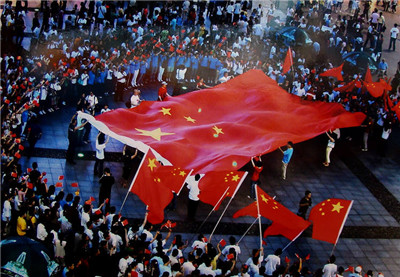
Nevertheless, certain civilizations developed huge advantages against their rivals. Economic historian Ian Morris says that for most of human history, a civilization’s economic strength depended largely on when it experienced an agricultural revolution. From there, it would take a nation thousands of years to turn itself into a true economic powerhouse. That is, until the industrial evolution upended everything. Here, in chronological order, are the five most powerful economic empires of all time:
然而在这个过程中,某些文明却取得了竞争对手难以企及的优势地位。经济史学家伊恩•莫里斯指出,在人类历史的大部分时间里,一个文明社会的经济实力在很大程度上取决于当地农业革命发生的时间。在此之后,一个国家还需要花费数千年的时间,才能变成一个真正的经济强国。也就是说,要等到产业的演进颠覆了一切之后才有可能实现。下面将按照时间先后顺序,列出史上最强盛的五大经济帝国:
1. The Roman Empire, circa 100 AD: 25 to 30% of global output
1. 罗马帝国,公元100年前后:占全球经济产出总量的25%-30%
Rome was the distant descendant of the very first agricultural revolution, which took place in modern-day Iraq. Rome rose quickly from a small republic to a dominant global empire in a matter of centuries. It cemented its status as a superpower in a series of wars, known as the Punic Wars, with Ancient Carthage. These conflicts gave Rome complete dominance of the Mediterranean Sea, a body of water that enabled trade to flow easily from the economically vibrant areas of the empire, like the city of Rome and Egypt.
罗马是全球首次农业革命(发生在如今的伊拉克境内)的间接产物。在短短数百年的时间里,罗马就从一个小小的共和国,迅速崛起成一个举足轻重的全球帝国。通过与古迦太基(Ancient Carthage)进行的一系列战争——史称“布匿战争”(Punic Wars),罗马巩固了自己的超级大国地位。这些冲突让罗马获得了地中海地区的绝对统治,这处水域让罗马城和埃及等充满经济活力的地区可以方便的进行对外贸易。

As economists today know, trade is a vital ingredient for economic growth, and the Romans were better at it during their height than anybody else. There is also evidence that the Romans had a sophisticated financial system that made extensive use of bank notes and other forms of credit, which enabled traders to forgo hauling precious metals across long distances.
当今的经济学家们都知道,贸易是经济增长的一大要素,而鼎盛时期的罗马人比任何人都擅长贸易。此外,有证据表明,罗马人还拥有一套完善的金融体系,广泛使用银行票据及其他形式的信贷商品,让商人不用再远距离运送贵金属。
2. The Song Dynasty in China, circa 1200 AD: 25% to 30% of global output
2. 中国宋朝,公元1200年前后:占全球经济产出总量的25%-30%
Agriculture came later to China than it did in the modern-day Middle East. But by the time Chinese civilization made good use of the benefits of agricultural society, around 1200 AD, they had created one of the most magnificent civilizations the world had ever seen. Some scholars, like Ronald A. Edwards, an economic historian of China’s Song Dynasty at Tamkang University, argues that it was China, not England, that experienced the world’s first industrial revolution. He draws on research conducted by Japanese and Chinese scholars that shows that China experienced per capita economic growth at the same time that its population grew, something Europe wouldn’t achieve for hundreds of years.
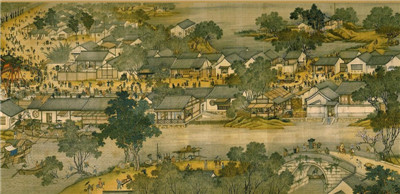
中国开始发展农业的时间要晚于现在的中东地区。但是到了公元1200年前后,当中华文明充分发挥出农业社会的种种优势时,他们已然创造出了史上最为辉煌的文明之一。有些学者,比如在台湾淡江大学研究中国宋代史的经济史学家罗纳德•爱德华兹认为,世界上最早经历第一次工业革命的国家应该是中国,而不是英国。他的依据是中日两国学者进行的研究,这些研究表明,当时中国在人口增长的同时,也经历了人均经济产出的增长,而欧洲在几百年之后都没有做到这一点。
3. Mughal Empire in India, circa 1700 AD: 25% of global output
3. 印度莫卧尔帝国,公元1700年前后:占全球经济产出总量的25%
Indian civilization is one of the oldest in the world, and many empires have risen and fallen on the subcontinent throughout the centuries. But among its most economically vibrant was the Moghul Empire, which dated from the sixteenth century until the establishment of the British Raj in the middle of the 19th. According to the late economic historian Angus Maddison, the per capita output of Mughal-era India was likely about the same as in England or France at the time, but “India had a ruling class whose extravagant lifestyle surpassed that of the European society.” This was achieved, however, “by subjecting the population to a high degree of exploitation.”
印度文明是世界上最古老的文明之一,而且多个世纪以来,已经有许多帝国在印度次大陆上盛衰沉浮。但其中经济最有活力的要数莫卧儿帝国,其统治时间始于十六世纪,一直持续到十九世纪中叶,英国在印度建立殖民统治为止。已故经济史学家安格斯•麦迪森曾指出,莫卧儿王朝时代的印度人均经济产出,很可能与当时的英国或法国相差无几,但是“印度统治阶层生活的奢侈程度超过了欧洲社会的统治阶层”,但是这是通过“对印度人民进行沉重剥削而实现的”。
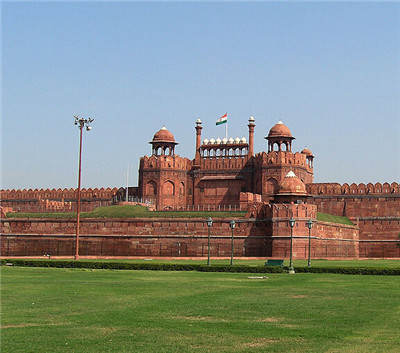
Though European traders who visited India during this time were impressed by the Mughal court, which Maddison describes as “one of the most brilliant in the world,” with its walled castles, gardens, fountains, literature, and painting, the Indian people were uninterested in the goods Westerners had to trade, beyond gold. Such a dynamic fueled the plunder of the newly discovered Americas for its wealth of precious metals. This persisted throughout the Mughal era, as European explorers began to insinuate themselves further into Indian society. The Mughal empire slowly decayed amid the rise of the industrialized British Empire, which officially colonized the subcontinent in the middle of the 19th century.
在这段时间里,来到印度的欧洲商人无不对莫卧儿王宫印象深刻——麦迪森称这里是“世界上最光彩夺目的王宫”,它拥有诸多围墙城堡、花园、喷泉、藏书和名画。但是,除了黄金之外,印度人对西方人用来交易的货物都不感兴趣。这种贸易关系促使西方国家纷纷涌向新发现的美洲大陆,去掠夺大量的贵金属。这种状况在整个莫卧儿王朝时代都持续存在,同时,欧洲人也开始渗透进印度社会。在工业化的大英帝国崛起之际,莫卧儿帝国慢慢地衰败了下去。十九世纪中叶,大英帝国在印度次大陆正式建立殖民地。
4. The British Empire, circa 1870: 21% of global output
4. 大英帝国,1870年前后:占全球经济产出总量的21%
For most of human history, economists have very little evidence to estimate historical GDP. But all that changes once we get to the height of the British Empire, where extensive tax and other records make the job a bit easier. The British are also the first empire on the list that dominated the globe economically without strictly controlling an equally large percentage of the global population. Britain’s advantage came from the huge technological boost of the industrial revolution, as well as its aptitude for profiting from its colonial possessions. At the height of the British Empire, about 6% of its total output came from its colonies, more than any other Western power.
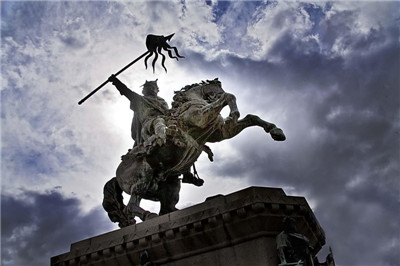
对于人类历史长河上的大部分时间,经济学家都没有足够信息,来估算出各国历年的国内生产总值(GDP)。但是到了大英帝国鼎盛时期,情况发生了变化,当时留下了大量的税收记录及其它记录,都为经济学家提供了参考。此外,在本文列出的这五大经济帝国当中,大英帝国也是第一个在没有控制同等比例人口的情况下,就在经济上称霸全球的国家。大英帝国的优势来自于工业革命对科技产生的巨大推动力,以及它从众多殖民领地中攫取利益的能力。在大英帝国的鼎盛时期,该国的经济总产出约有6%来自于殖民地,这一比例要高于任何其它西方大国。
5. The United States of America, circa 1950: 50% of global output
5. 美国,1950年前后:占全球经济产出总量的50%
By the end of World War II, the U.S. produced half of the world’s economic output, by some estimates. However, that statistic is a bit misleading. It’s not that America was twice as dominant at its height than other states on this list. After all, America was only briefly this dominant, due mostly to the fact that most of the developed world’s economies had been destroyed by World War II. Yes, America likely became the world’s largest economy in the late 19th century on the strength of its large population, vast natural resources, and entrepreneurial spirit. But its total economic dominance in the middle of the last century was a product of the war.
据某些估算数据显示,第二次世界大战结束时,美国的经济产出已经达到全球总量的一半。不过,这个统计数字有点容易让人误解。这并不是说,美国巅峰时期的经济实力比其他四大经济帝国高出两倍。毕竟,美国登上这一霸主地位为时尚短,而且它的成功在很大程度上是因为,大部分的发达经济体都因第二次世界大战而崩溃。是的,鉴于美国人口众多、自然资源丰富并且富有开拓精神,该国本就有希望在十九世纪后期成为全世界最大的经济体。但在上世纪中叶,美国在经济上占据的霸主地位只是第二次世界大战的产物。
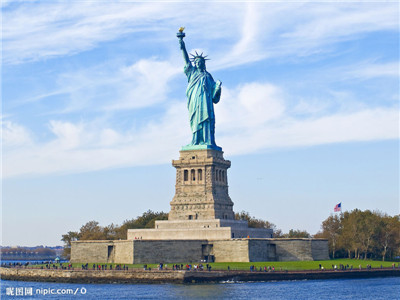
Since that time, America’s relative power has been on the decline, not because of slow growth at home, but because the rest of the world is catching up. But as you can see, this follows a broad historical pattern: economic revolutions occur in one part of the world, and then spread elsewhere. Kings of the economic hill are difficult to unseat, and are usually only overthrown following massive conflicts, or because of some economic revolution elsewhere. Britain gained its status because of the industrial revolution, which enabled it to smash through the growth ceiling that agricultural economies faced. “We may face a similar ceiling for fossil fuel societies,” says Ian Morris, “and if the same historical rhythms keep playing out, then the only way to get through that will be that we also have to revolutionize the way we do things.”
自那时以来,美国的相对实力一直呈现衰落的态势,这并不是因为美国国内经济增长放缓,而是因为世界其他国家正在迎头赶上。但是,如你所见,这遵循的正是一种普遍的历史发展模式:经济革命在世界上的某个地方发生,然后蔓延到其他地方。全球经济霸主的地位很难撼动,通常只有在发生大规模冲突之后,或者由于其他地方发生某种经济革命,才会被推翻。英国之所以赢得了经济帝国的地位,全因工业革命让它能够冲破农业经济所面临的经济发展天花板。伊恩•莫里斯说:“我们现在的矿物燃料社会可能也会面临类似的天花板。而如果历史继续呈现同样的发展节奏,要突破这种经济增长天花板的唯一途径,就只有彻底地改变我们发展经济的模式。


